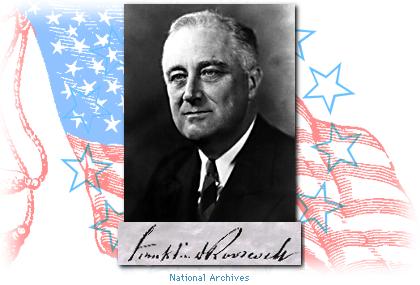
Works Progress Administration
Federal Writers’ Project

"I doubt that he [President Roosevelt] expected the projects to produce paintings or plays or books or records of the first importance. Certainly it was with no such purpose in mind that the projects were established. What was intended was a declaration – the first in modern history of the federal government – that those who follow learning and the arts are as important to the Republic as those who follow other callings . . ."
Archibald MacLeish,
New Republic, April 15, 1946
The Works Progress Administration was created in 1935 as a program to produce work for the unemployed. It was established as an agency by Executive Order 7034 on May 6, 1935 under the authority of the Emergency Relief Appropriation Act of 1935 (U.S., Apr. 8, 1935, c. 48, 49 Stat. 115). On July 1, 1939 the name of the organization was changed to Work Projects Administration and it was moved to the Federal Works Agency. The WPA was abolished on December 4, 1942 in a letter to the agency from the President when wartime economy eliminated the need for it.
This was one of the few relief organizations to consider and utilize the skills of the ‘white collar’ unemployed, such as writers, artists, and actors. Under this organization the Federal Writers’ Project prepared guides for every state and territory which contained essays on geography, architecture, history, and commerce. They also produced local histories, ethnic studies, folklore collections, and nature studies. Initially the SuDoc number for the publications of this project was Y 3.W 89/2:24 CT but with the change of agency the name became "Writers’ Publications" and the new SuDoc number was FW 4.28:CT.
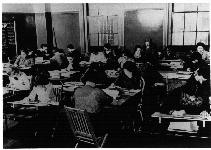
Federal Writers’ Project personnel
The FWP was directed by Henry Alsberg and at one time employed over 6,600 people. Some of the notable writers employed in this activity were Zora Neale Hurston and Frank Yerby (here in Florida), Conrad Aiken, Richard Wright, Ralph Ellison, and Saul Bellow.
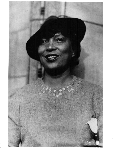
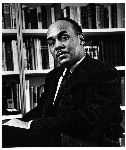
Zora Neale Hurston and Ralph Ellison
The Cumulative Subject Index to the Monthly Catalog of US Government Publications is a good place to start to research this agency’s publications. The "Andriot’s" Guide to U.S. Government Publications might be a better help because it gives the SuDoc numbers for the issuing agency and would help one decide where they might be held. In the University of Florida libraries both of these aids can be used to give a clue to the titles of publications, as Federal publications before 1976 are difficult to find in LUIS. LUIS was a help in tracking down elusive FWP publications on Florida and Jacksonville that had been cataloged for the ‘Florida Collection’. A judicious mixture of keyword and corporate author (Writer’s Program<Fla.>) searches yielded a good selection of information and a good starting point for shelf browsing.
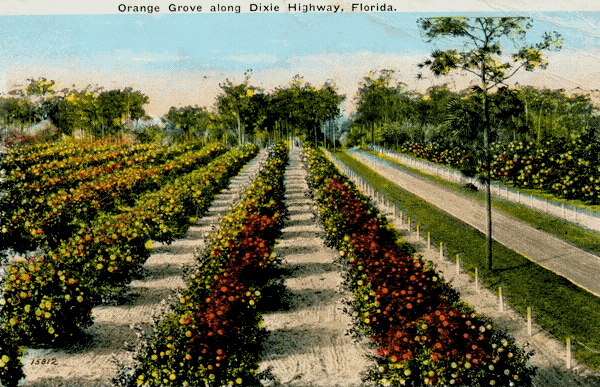
Florida State Archives
Florida:
Writer’s Program (Fla.) Florida Folk Lore and Custom. <S.l: s.n., 193-?> 26 leaves.
In order to preserve the language and literature of the people of the United States the FWP documented the folklore of the citizens. This is one of the documents produced to conserve the oral histories, jokes, tall tales and songs of native Floridians.
---, The WPA Guide to Florida : the Federal Writers' Project Guide to 1930s Florida. Florida. New York: Oxford University Press, 1939. (American guide series) 600 pages, 64 pages of plates.(The copy examined was a 1984 reprint of the original 1939 edition)
The production of a guide series for every state was the main goal of the Federal Writers’ Project. One of the missions of the FWP was to document folk and ethnic life and this work accomplishes this goal by acknowledging the existence of and exploring the contribution of the African-American and Native-American population of the state.

Florida State Archives
Jacksonville / Duval County:
Clark, John. Brief Comments on Unusual Happenings in Early Jacksonville, Florida. <S.l: s.n., 193-?> 2 leaves.
Shepherd, Rose. Bolles School, San Jose, South Jacksonville. <S.l: s.n., 1937> 8 leaves.
---, Jacksonville, Early History. <S.l: s.n., 1937> 3 leaves
---, Jacksonville Buildings: Duval County Court House: Forsyth and Market Streets. <S.l: s.n., 1937> 5 leaves
Writer’s Program (Fla.). Duval County. <Mandarin, Fort George, etc.> 1935
These individual documents represent another interest of the FWP to document local history. The histories themselves were gathered from a variety of sources such as newspapers, eyewitnesses, and city records. Many of the documents traced the histories of the land and city back to the 1700’s and the Spanish land grants.
Writer’s Program (Fla.) Biographical Sketches, Jacksonville, 1936-41. <n.p> <n.d>. I volume, various paging.
This is a large collection of interviews and reminisces most of which are only a page or two long. There were a wide number of people interviewed including politicians, social leaders, Civil War and Spanish-American War veterans, ethnic groups, and average citizens. This collection draws together in one place priceless oral histories of the people who shaped the path of the early development of Jacksonville.
The Library of Congress created two noteworthy Internet sites:
American Life Histories; Manuscripts from the Federal Writers’ Project, 1936-1940.
http://rs6.loc.gov/ammem/wpaintro/wpahome.htmlThis is the opening page of a web site created by the Library of Congress to provide access to a selection of 2,900 documents containing the life histories of people living in the United States in 1939-1940.
WPA Life Histories from Florida. (which contains 128 full text manuscripts)
http://lcweb2.loc.gov/ammem/wpaintro/flcat.htmlThis is the introductory page for the Florida section. The subjects covered in the 128 full text documents linked from this page are agriculture, local history, industries, religion, politics, health care, daily life, folklore, and ethnic groups. The full text documents can be accessed by a listing or by a site search engine.

Florida State Archives
Return to Adventures in HTML
Return to Home - Relative When